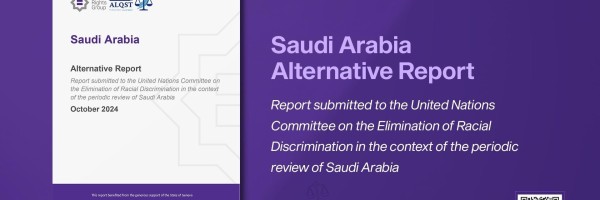‘A prison without bars’: living with disabilities in Saudi Arabia
December 3, 2016 – International Day of Persons with Disabilities
The Saudi government is failing to meet its obligations to the kingdom’s disabled citizens. Service provision is underfunded and inadequate, and the rights to dignity, equality and access to participation in society are barely addressed.
As the United Nations marks the tenth anniversary of the Convention on the Rights of Persons with Disabilities – to which Saudi Arabia signed up in 2008 – ALQST reports on disability rights in the country, in theory and on the ground.
Research on disability-related issues in Saudi Arabia is limited. Data is scarce and incomplete, but the King Salman Centre for Disability Research says that around 10% of the nearly five million students enrolled in Saudi schools – that is, up to 500,000 children – may have learning disabilities. Estimates for the total number of people with disabilities across the kingdom have ranged from one to over four million, depending on the definitions used. Major causes of disability in Saudi Arabia are cerebral palsy, road traffic accidents, strokes, and genetic disorders associated with the prevalence of first-cousin marriages.
The government has policies and laws supporting the equal rights of people with disabilities, but they are underresourced and not implemented effectively. The actual provision of services is poor, and it is often difficult to find the specialised care many disabled people need. There is a shortage of capacity in rehabilitation hospitals and specialised rehabilitation units, and the facilities are substandard. In 2012 a series of scandals concerning the abuse of disabled children and adults in government rehabilitation centres led to an investigation by the Ministry of Social Affairs, the sacking of some care workers, and pledges to increase levels of oversight.
One source told ALQST that the standard of health care and medical services on offer at government rehabilitation centres is abysmal, and the only high-quality provision available is from a few, hugely expensive, private providers. The tight restrictions on civil society, voluntary or charitable activities leave people with disabilities almost nowhere else to turn for affordable support.
In his message for this year’s International Day of Persons with Disabilities, UN Secretary-General Ban Ki-moon urges governments, businesses and everyone else to work to end discrimination and remove the “obstacles that prevent persons with disabilities from enjoying their civil, political, economic, social and cultural rights” – rights that in Saudi Arabia are also routinely denied to the population as a whole.
The Disability Code introduced in Saudi Arabia in 2000 ignored these rights, however, and focused only on disability prevention, welfare and habilitation – along with detailed plans for a bureaucracy to coordinate these services. It completely overlooked the vital issues of dignity, accessibility and the right to participate in all aspects of society on an equal basis with others. Yet the denial of these fundamental rights creates further obstacles to a decent life, and is disabling in itself.
A man in Riyadh, describing his own experience, told ALQST that living with a disability in Saudi Arabia is like being in a prison without bars. Even in the capital, he said, the pavements are impossible to navigate, and shops, cafés and restaurants, 90% of mosques, schools and most universities do not have disabled access. As a result, people with disabilities and mobility issues are forced to stay shut in at home and become totally isolated from their communities and the world outside.
The situation is scarcely any better for people with sensory disabilities, like hearing and visual impairments. A mother with two such disabled children told ALQST that there had been no support for her in coping with her children’s special needs, and she had struggled to get them accepted into schools. Their impairments were not severe enough for them to be sent to a special school for blind or deaf children, but the teachers at their mainstream schools had no training and little understanding of how to deal with them – and not much sympathy either.
In 2015 the government announced a new initiative to integrate children with disabilities into mainstream education, in line with international best practice. However, rights activists in Saudi Arabia say schools do not always cooperate with the Education Ministry’s directions in this regard, and sometimes simply pocket the extra budget they now get for enrolling students with special needs.
There are isolated examples of progress on the disabilities front, in King Saud University’s Special Education Department, for example. But overall, the authorities’ failure and lack of will to implement the laws they themselves pass, and to meet their obligations under the Convention on the Rights of Persons with Disabilities, reflects badly on a country that is blessed with the resources to do so much more for its disabled citizens – and, on a mutual and equal basis, all the citizens and residents of the kingdom.
Download English pdf تحميل pdf عربي
‘A prison without bars’: living with disabilities in Saudi Arabia Website: https://t.co/srchsBJNwu PDF: https://t.co/9F7i8Gjt6C#IDPD2016 pic.twitter.com/4PpLFrjJUr
— القسط ALQST (@ALQST_ORG) December 3, 2016




